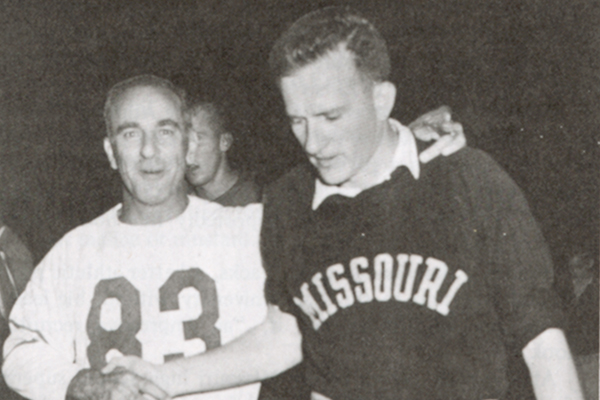
1950s
The first serious adversity Frank Broyles faced, either as player or coach, came when Missouri lost the final three games of 1957, his only season there, and then his personal losing streak was extended to nine with six consecutive losses at Arkansas in 1958.
His first Razorbacks squad rebounded with four November victories, a prelude to a 9-2 season in 1959, worth a Southwest Conference tri-championship and a trip to the Gator Bowl for a 14-7 victory over his alma mater, Georgia Tech, and Coach Bobby Dodd, his preceptor and former boss.
Arkansas Athletic Director John Barnhill kept a sharp eye on Broyles’ work as Dodd’s offensive coordinator from 1951-1956, while Tech went to six consecutive bowl games and won them all. However, Barnhill had a policy of not hiring coaches who lacked head-coaching experience. That technicality was fixed by Broyles’ 5-4-1 Missouri season, so Barnhill called him after Arkansas Coach Jack Mitchell bailed out to Kansas.
1957 Accepts job as Arkansas football coach after one season at Missouri.
1958 Finishes first Arkansas season at 4-6, one of two losing seasons in 19-year tenure.
1959 Goes 9-2, wins first of seven SWC Championships.
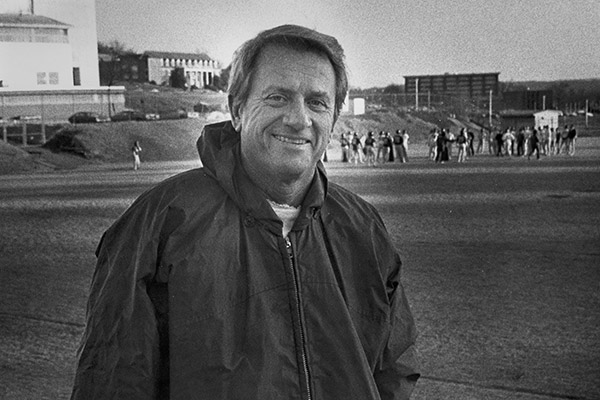
1960s
The once balanced SWC wilted under the double dominance of Texas and Arkansas, two programs at high tide under Darrell Royal and Broyles. The Longhorns won two national championships in the 1960s, and Arkansas won one in 1964 during a 22-game winning streak. From 1959-1970, the Longhorns and Razorbacks won or shared every SWC football title except two.
Undefeated and ranked 1-2 in the polls, Texas and Arkansas played for the national championship at Fayetteville on Dec. 6, 1969, but actually a whole decade was at stake going into the Big Shootout.
You probably don’t have to be told Texas won 15-14. It was traditional that several sportswriters would have dinner at the Broyles home following a Fayetteville game. Crushing disappointment or not, Broyles kept the amenities in place that evening. A Texas-based reporter who was there said several years later, “I never had so much respect for Frank as I did that night. He’d just lost the crowning game of his career after coming so close, but he was willing to sit there and make small talk. It must have been excruciating for him and Barbara.”
1960 First Cotton Bowl team finishes 8-3 after 7-6 loss to Duke.
1961 Gains share of third consecutive SWC title, ending with 8-3 record after 10-3 loss to Alabama in Sugar Bowl.
1962 9-2 season ends with 17-13 loss to Ole Miss in Sugar Bowl.
1963 5-5 season ends with Nov. 24 victory over Texas Tech.
1964 Goes 10-0 in regular season and beats Nebraska 10-7 in the Cotton Bowl to win a share of the national championship.
1965 Goes 10-0 in regular season, building winning streak to 22 games.
1966 Winning streak ends with 14-7 loss to LSU in Cotton Bowl.
1967 Suffers second and final losing season, finishing at 4-5-1. Inducted into Arkansas Sports Hall of Fame.
1968 Wins sixth SWC title, finishes 10-1 overall.
1969 Loses Big Shootout 15-14 to Texas in Fayetteville, with President Richard Nixon in attendance.
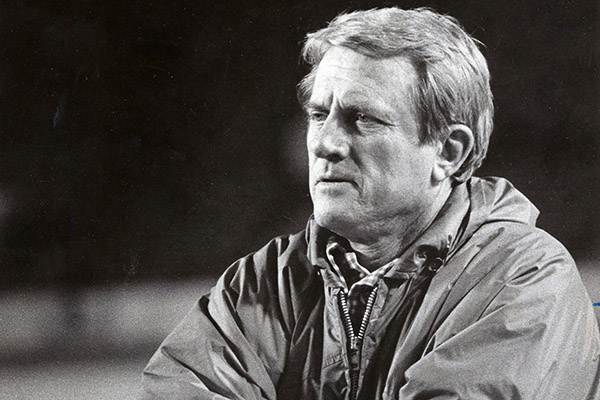
1970s
Broyles became athletic director in 1973, while retaining his coaching duties through 1976, but his concerns about facilities started long before he was named AD.
“We were so far behind in facilities by 1972 that our recruiting suffered tremendously,” Broyles said in a 1979 interview. In November 1972, the Board of Trustees accepted his proposal to raise money with a new form of subsidy tied to ticket priorities.
The structure now called the Broyles Complex was in place by 1975 when the Razorbacks won their seventh SWC title under Broyles and went on to a 31-10 Cotton Bowl victory over Georgia. As full-time athletic director, Broyles remained locked in on improvement; he simply widened the scope and excised negatives from the Razorbacks’ total program.
He hired Eddie Sutton in 1974 to bring the basketball program into the late 20th century. He hired Lou Holtz as his immediate football successor. With much less fanfare, he put John McDonnell in charge of track and field. Soon, there was seething interest in Razorbacks athletics from September to June, rather than from the day after the bowl game to the start of spring practice.
1973 Replaces George Cole to become athletic director. Hires John McDonnell as cross country coach.
1974 Hires Creighton’s Eddie Sutton as Arkansas’ basketball coach.
1975 Beats Georgia 31-10 in the Cotton Bowl in his final bowl appearance as coach.
1976 Goes 5-5-1 in final season as football coach, finishing with 19-year record of 144-58-5.
1977 Hires Lou Holtz as replacement. Promotes McDonnell to coach of track program. Begins 9-year stint as ABC college football color analyst with famed Keith Jackson.
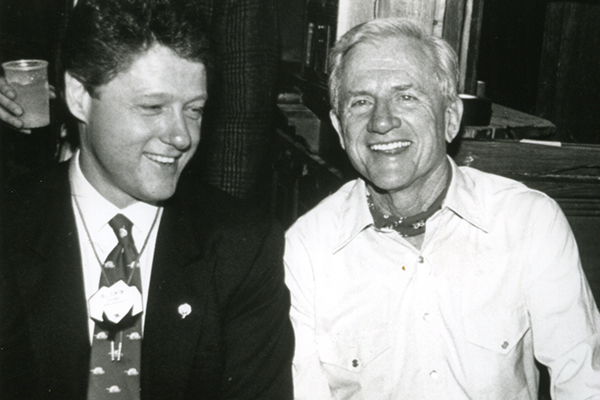
1980s
Broyles faced coaching searches in football and basketball after firing Holtz when the 1983 season ended and feuding with Sutton, who “crawled” to Kentucky to get away from Broyles after the 1984-1985 season.
Broyles brought in former Razorback Ken Hatfield to run the football program and made Nolan Richardson the first black basketball coach at a major school in the South.
Hatfield won a lot of games but also clashed with Broyles regarding assistant coaches and bolted for Clemson after the 1989 season.
Richardson’s teams closed the decade by becoming the SWC’s dominant basketball program after a shaky start. Broyles also oversaw a major addition to Razorback Stadium when an upper deck and skyboxes were built on the west side. The track and field program turned into a national powerhouse and began piling up NCAA championships beginning in 1984 under McDonnell, the former shop teacher Broyles decided would make a good coach.
1983 Fires Lou Holtz.
1984 Hires Ken Hatfield, a former Arkansas player, as Holtz’s replacement.
1985 Hires Nolan Richardson as basketball coach, making Arkansas the first major southern university to hire a black coach.
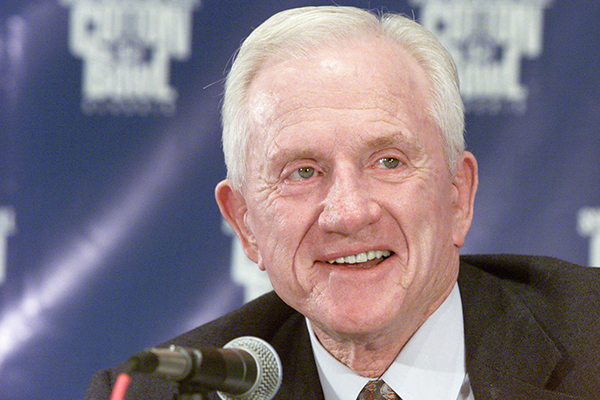
1990s
Broyles had the vision to see the SWC was a sinking ship and directed Arkansas’ move to the SEC, which gave the athletic department financial stability and a place in the country’s most competitive conference.
But Jack Crowe never got to coach an SEC game. Broyles made national headlines by firing Crowe as football coach one game into the 1992 season after the Razorbacks lost to The Citadel. Broyles then turned to Danny Ford, who left the program in much better shape than he found it and won a 1995 SEC West title, but couldn’t sustain success and also was fired.
Broyles then hired Houston Nutt, who resigned after the 2007 season.
Richardson led the basketball program to three Final Fours in 1992, 1994 and 1995 and won the 1994 national championship. Facilities went to another level with the building of Walton Arena and Baum Stadium.
1990 Promotes Jack Crowe from offensive coordinator to head coach after Hatfield leaves for Clemson.
1991 Makes the decision to have Arkansas move from the SWC to the SEC.
1992 Fires Crowe after Arkansas loses to Division I-AA The Citadel in season-opener. Hires Danny Ford as head coach after season.
1993 Walton Arena, with 19,200 seating capacity, opens as new home of Arkansas basketball team.
1994 Nolan Richardson’s basketball team wins NCAA Championship.
1996 Baum Stadium, regarded as one of the nation’s finest college baseball facilities, opens.
1997 Fires Ford as football coach after 26-30-1 record in five seasons. Hires former player Houston Nutt as Ford’s replacement. Basketball program receives sanctions from NCAA.
1998 Becomes longest-tenured Division I athletic director after retirement of Rutgers’ Fred Gruninger.
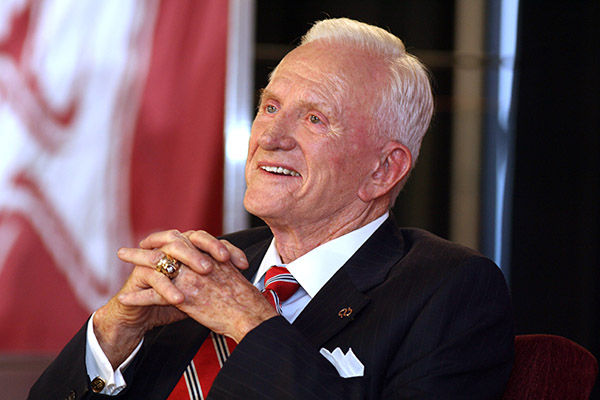
2000s
Broyles and Richardson had a messy parting in March of 2002, when Richardson was fired. Richardson filed a lawsuit based on discrimination, but didn’t win it. Broyles hired Stan Heath to replace Richardson.
The upgrading of facilities continued with a major renovation of Reynolds Razorback Stadium and the building of indoor and outdoor track facilities that have or will host NCAA meets. Baum Stadium also has continued to be expanded and has hosted NCAA baseball regionals.
Broyles hired former Razorback Dave Van Horn in 2002 to replace Norm DeBriyn, the coach who built Arkansas’ baseball from the ground up.
2000 Opens Randall Tyson Track Center, which will host 5 consecutive NCAA Indoor Track championships.
2001 Sets off statewide firestorm by reducing games played in Little Rock after expansion of Reynolds Razorback Stadium.
2002 Fires Nolan Richardson after Richardson dares the university to buy out his contract. Hires Stan Heath, with one year of Division I coaching experience, as Richardson’s replacement.
2003 Hires Dave Van Horn as baseball coach when Norm DeBriyn retires. Football and basketball programs placed on three years probation.
2006 Meets with parents of celebrated Springdale football players Mitch Mustain, Damian Williams and Ben Cleveland. Among other topics, the parents express concern about the direction of the offense.
2007 Announces retirement after 19 years as head football coach and 34 years as athletic director, effective on Dec. 31. Fires Heath after back-to-back NCAA Tournament appearances. Hires Dana Altman, who reneges the following day, then hires John Pelphrey.

